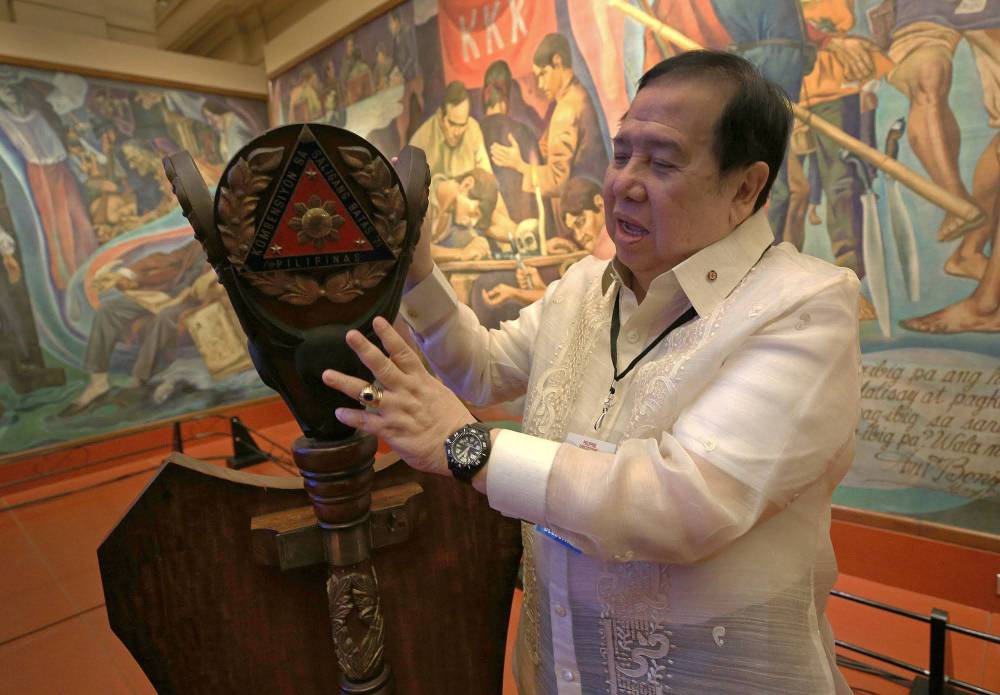Angara, not Padilla, to preside when Senate tackles Charter change

Sen. Juan Edgardo Angara on Tuesday confirmed that he would head a Senate subcommittee to tackle the chamber’s proposed resolution amending certain economic provisions of the 1987 Constitution.
He takes over the role of Sen. Robinhood Padilla, the Senate’s persistent Charter change (Cha-cha) advocate, who has also been pushing for longer terms for the President and other elected officials.
Angara said majority of the senators agreed that a lawyer like him should lead the proceedings, since the matter to be tackled under Resolution of Both Houses (RBH) No. 6 is the revision of the country’s basic law.
Senate President Juan Miguel Zubiri on Monday filed the resolution, which was co-authored by Angara and Senate President Pro Tempore Loren Legarda.




Padilla’s proposal
But according to Angara, the subcommittee would still have to enlist the support of Padilla, since he heads the Senate committee on constitutional amendments and revision of codes.
“The report of the subcommittee will have to be approved by [Padilla] as committee chair,” Angara said.
He said the subcommittee, upon its formation, would meet with Padilla to discuss Resolution of Both Houses No. 5—Padilla’s proposed measure to extend the term limits of elected officials.
Angara, however, maintained that the Senate’s push for Charter change would be limited to three constitutional provisions.
These are Section 11 of Article XII (National Economy and Patrimony), which requires 60-percent Filipino ownership of public utilities; Section 4 (2) of Article XIV (Education), which requires 60-percent Filipino ownership of educational institutions; and Section 11 (2) of Article XVI (General Provisions), which requires 70-percent Filipino ownership of any enterprise in the advertising industry.
In a radio interview, Angara said: “We will have to talk about his (Padilla’s) proposal [on political reforms], because most of our colleagues in the majority only favor the change in the economic provisions.”
He added that “matters on the system of government or term extension” are not on the table.
Initially opposed
Padilla, who is still abroad, issued a statement expressing support for RBH 6, saying the Senate-led Cha-cha is “good news for the nation.”
“Our economy will be revitalized and this will lead to progress in the lives of Filipinos,” said the former action movie star.
Padilla said his committee came up with a report early last year, following consultations with different sectors in the country.
He said the report recommended amendments to seven economic provisions in the Constitution, including the three that are now the subject of RBH 6.
He claimed, however, that none of the senators supported the recommendations at that time, even those seeking to ease restrictions on foreign ownership in business.
Zubiri said on Monday that he, too, had been opposed to Charter change in general.
But he sought an audience with President Marcos on Jan. 9, as the controversy over the people’s initiative campaign to amend the Constitution became “too divisive.”
That campaign “could have led to a constitutional crisis, destabilizing our bicameralism and upsetting the system of checks and balances,” the Senate leader said.
Legal experts define a constitutional crisis as a breakdown among institutions established by a given constitution because of a major political dispute.
Zubiri had noted that “in any conflict, it is always the people who stand to suffer the most.”
He said it was the President himself who “asked the Senate to instead take the lead” in Charter change.
‘Stop already’
This time, senators expressed support for Charter change, but within the scope of RBH 6.
“The Supreme Court had invalidated the joint exploration agreement that the Philippines entered into with Vietnam and China. [So] for me, we need foreign investments for us to explore, exploit, develop and extract our natural resources in the West Philippine Sea,” Sen. Francis Tolentino said in a news briefing on Tuesday.
Sen. Sherwin Gatchalian said “I have taken the position for the longest time to support discussions on amending certain provisions of the Constitution that would lead us to fully realize the economic potential of the country.”
“PI should stop already,” he also said, referring to the signature drive of the people’s initiative campaign.But Sen. Imee Marcos said she was still skeptical about RBH 6.
“After the very surreptitious and dubious manner that this people’s initiative was initiated, it doesn’t generate any confidence, at least on my part, that there will be a limitation to the mere three provisions,” said the President’s eldest sister.
Pitch in Davos
Speaker Martin Romualdez has expressed support for RBH 6, following his meeting with Zubiri two days after the Senate leader met with Mr. Marcos.
In Davos, Switzerland, where he led the Philippine delegation to the World Economic Forum, Romualdez made another pitch for Charter change, this time with the Senate’s collaboration, saying this shows the country would soon become more “investor-friendly.”
“We will repeat the message that the Philippines is open for business, we are strong, and we are united,” he said.
Meanwhile House Majority Leader Manuel Jose Dalipe said in a statement: “In an extraordinary development for our nation, the Senate has finally seen the light, embracing the House’s long-standing belief in the necessity of constitutional amendments.”
“We are encouraged by the Senate’s acknowledgment of the House’s position and look forward to collaborating closely to ensure the effective passage and implementation of these constitutional amendments,” he added. —WITH REPORTS FROM JEANNETTE I. ANDRADE, KRIXIA SUBINGSUBING AND INQUIRER RESEARCH INQ Angara, however, maintained that the Senate’s push for Charter change would be limited to three constitutional provisions
















